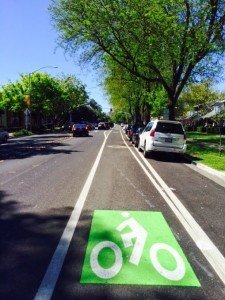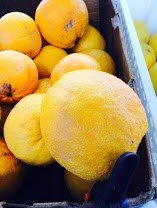Farmers' Market Success: 6 Tips for the Best Trips
Arugula at the Farmstand
Farmers' market season is in full swing! I was lucky enough to tour the Davis Farmer's Market. It was voted the best in the U.S. Farmers' markets offer tons of produce and delicious prepared foods for making healthful and delicious meals, but sometimes getting started at the market can be a bit daunting. You're in luck, though, because simple tips and tricks can turn the experience from overwhelming to downright fun!
Tip #1: Look for your favorite foods, but also seek opportunities to try something new. A true farmer's market will change as the growing season evolves. Check out what's new each week, and feel free to talk to the vendors about ways to prepare each food. Free samples are often abundant -- they can be your best friend when trying something new.If you feel too shy to ask the people working at the farmstands, or if they're swamped with customers, there are other ways to learn about new foods. For example, try taking a photo of a mystery food. Post the photo to Facebook and ask your friends about it. Is the food tasty? What's their favorite way to prepare it? Why? Alternatively, you could write down the name of the mysterious ingredient and do a little research online. As far as the seasons go, greens are almost always first to the plate, with tomatoes and fruits coming into play as they ripen. Greens are very delicious, and fresh summer tomatoes are a treat. Spring onions, small greens, and tiny potatoes can turn a meal into a star memory during the summer.
Tip #2: Watch out for baked goods! Most farmer's markets have a few stands that sell huge baked goods. Remember that anything the size of your hand is going to have an average of 400-500 calories. If baked goods are even bigger than that, watch out! They're probably calorie bombs.Note: This rule of thumb doesn't apply to produce, of course. A handful of lettuce has only 20 calories or so. When in doubt, go with fruits and vegetables.
Tip #3: Enjoy the walk. Strolling the farmers' market can be good exercise, especially if you make a few laps around the stalls and park your car farther from the stands. I was able to walk 10,000 steps by parking a few blocks away from the market. Plus, I saved myself the headache that comes from navigating the parking lot crowds.
Tip #4: Pack smart! It's a great idea to bring your own bags to the farmers' market, and it's an even better idea to bring along a few cooler packs or a bottle of frozen water. This will help you keep your greens (and other delicate purchases) cool as you shop. Plus, you can take sips out of the frozen water bottle as the ice melts. Refreshing! A hat and sunscreen are also farmers' market musts. Having cash handy is helpful too -- with it, you can buy a few things from many stands. More and more farmers' markets offer "market bucks" or credit card readers, and some stands still take personal checks. However, no one turns away cash, at least no one that we've met at the market. Keep a few dollars handy and you'll keep your options open.
Tip #5: Don't judge a book by its cover. Many of the foods you'll find at a farmers' market won't be as uniform as those you're used to seeing at the grocery store. That's precisely the point. Often, these less-perfect-looking foods are packed with the most unbelievable flavor. So don't let a funny lump or lone wormhole dissuade you from picking up tasty new food.
Tip #6 Make the most of your berries. Don't forget fresh berries or other fruits for dessert. If you bought too many berries, you could always make a quick freezer jam by sprinkling a little sugar on sliced overripe berries. Freeze half-cup portions of the mixture in zip-lock bags. When you're ready to use your freezer jam, you can thaw out a bag and smear the berries on whole-grain toast. They're also great when spooned over plain, nonfat Greek yogurt. What a tasty breakfast (or dessert)!
So that's it. Seven tips for making the most of your trip to the farmers' market.
Now you can pat yourself on the back and call yourself a locavore. And, if you want the story of locavores, star chefs, exquisite American and Californian produce, famous Californian restaurants, and, of course, farmers' markets, then check out Californian Food Revolution by Joyce Goldstein. In her new book, Joyce features the stories of over 190 people, including herself, who created California cuisine, teaching themselves how to do it as they went.
My favorite story is the history of the French Laundry restaurant. It started as a small "ma and pa" restaurant, later purchased by Thomas Keller. Its focus on the beauty and simplicity of food is still very evident today.
Looking for more? Check out this week's top-selling nutrition education posters!
Plus, the MyPlate plates are finally available! Use plates that look like MyPlate for fun food lessons any time of year!
Remember, there's always more in the Nutrition Education Store!







